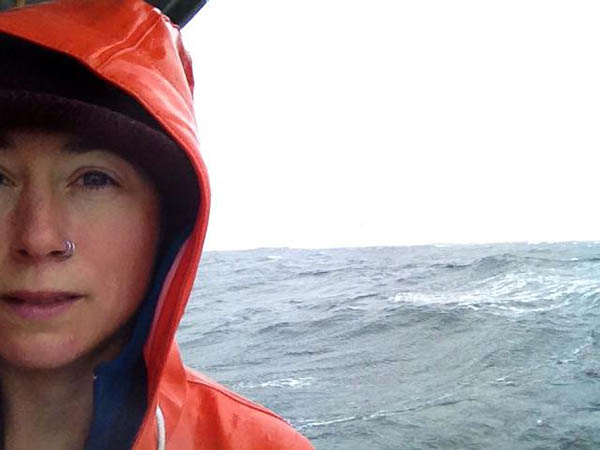A special mentor recently shared the concern she’d felt upon imagining my life at sea. Cradling a glass in her hands, she recalled, “I wondered, ‘Is she ever scared?’”
I immediately assumed she was referring to the fear that comes of realizing how insignificant and powerless you are, utterly dependent on the sea’s benevolence and a consistently winning hand of good judgment, good preventative maintenance, and good luck.
Then she continued. “‘At night, when everyone’s had a few too many shots of vodka, does she feel afraid then? If so, what does she do with that fear?’” (Yes, this friend is a trained therapist.)
It’s telling that this, one of the first concerns other females bring up when speaking with a fisherwoman, wasn’t on my radar. For the past few years, this gender-based issue has been a non-issue for me. I’m fortunate enough to only work on the boats of close friends these days – trolling with my sweetheart, Joel, and longlining with trusted friends, like my “brother,” Martin. Every season, I feel gratitude for the comfort, ease and safety I experience on these boats. It wasn’t always this way.
Growing up crewing for my mom, I – like all boat kids – fantasized about working on other boats. That if I could just get loose of the family obligation, there was a whole fleet of highliners I’d lobby for a spot on. One troller in particular was at the top of my list. I loved listening to that skipper on the radio, that whiskey-voiced, casually blasphemous, warmly self-deprecating tone so essential to fishermen’s storytelling.
It’s with some chagrin that I recall leaving a note at the fish plant, fisherman’s fan mail in adolescent scrawl, prattling on about how I hoped to crew for him one day. Many years later, I’ll hear dock gossip about this man, whispers of his assault of a female deckhand. I’ll look more knowingly upon the scarlet spider webs erupting from his nose and eyes, and will understand the most critical lesson that all deckhands must learn – there can be oceans of difference between who someone appears to be on the dock and who they end up being at sea, and that difference is virtually impossible to predict.
My mom’s last season was 1996, forced out by a few bad seasons that failed to quench her boat’s bottomless financial thirst. And with that, I was a free agent. Have X‑tra Tufs and Grundens, will crew. Boat-hopping through the Sitka troll fleet was an education in the peculiar dynamic of going to sea with someone. Our culture is bursting with cautionary tales against hitchhiking, strident warnings (particularly to young women) to never get into a car with a stranger, yet the maritime equivalent is standard practice for fishermen.
Far more intimate than sharing space in an automobile, imagine voluntarily locking yourself into a stranger’s home – their cramped, knees-touching-under-the-table, brushing-up-against-each-other-to-pass-wherever-you-are tiny home. You might be at sea for five days, you might be out for two weeks. Whatever the duration, you’ll have no contact with anyone other than your shipmates for that time. You share every aspect of living space, sleeping in a bunk mere feet away from your captain and any other crewmembers. (If you’re lucky, there’s an enclosed bathroom. Many of the boats I’ve worked on, the head is a five gallon bucket, for use on the open deck. I tried to make sure I didn’t have “to go” until I knew the captain would be occupied at the helm.)
Any professional deckhand who’s tossed his or her sea bag aboard multiple vessels will have their own blog-worth of these stories. The safety concerns – abusive behavior, ugly drunks, mental instability that doesn’t appear until you’ve left the dock – are extreme examples, rare in our small fleet. Far more likely is that you end up with a “screamer” – an impatient captain who’s a poor teacher – or find yourself in polar opposition to the political or social views of the person responsible for your crewshare. Maybe not a safety concern… But miserably awkward while sharing 48’ of living space, without reprieve, for weeks on end.
I speak from a deckhand’s perspective, but the view is no better from the pilot seat. My romantic fantasies of running my own boat went out the window when I realized the most daunting part of being in charge: finding good crew. As Martin explains, it’s not about finding someone who can do the work, but “finding someone I want to live with for three months.”
Let’s step back in time once more, back to that thirteen-year old girl so desperate to forge her own identity. When my mom and I returned to town with our latest fish delivery, I ran up to the office. Never mind laundry or a two-week past due shower; my first destination in port was always the mail room. Tearing into the pink message slip awaiting me, I was thrilled by the response. Thanking me for my note, the chicken-scratch lettering assured, “We’ll figure out an appropriate boat for you when you’re a little older.”
Twenty years later, I still see that skipper occasionally. I’m always pleased to see him, give a hug, and get a bristly-bearded kiss on the cheek in return. He’s rooted in my memory as one of those rare adults who treated a kid seriously, responding to a ridiculous request with grace and equanimity. And therein lies the life lesson: I’d never leave the dock with the captain, but I’m grateful to know the man on shore.




Good Morning, Tele! Glad to see you’ve taken up your pen again!! These are really good from many aspects. For me, never having been a crew on a fishing vessel, they are very informative about the sea life experience. I also like the more social anthropological aspect as well. Your writing is really good! I hope you stick with it. Love to you, J
Joy! Hello! I suspect “Hooked” will teach me some narrative balancing lessons… How to step outside of myself, steeped in insider knowledge, to make a foreign lifestyle accessible to folks who’ve never experienced it, while sharing something enjoyable and relevant for my fishing community? Thanks for the kind words — I’m delighted that the posts are working for you. Hugs!
this is a wonderful blog. have signed up to be notified when new posts are up. you are a treasure and i am glad to have ‘met’ you on Mudflats.….love bubbles
Bubbles, thanks so very much for your kindness — I’m thrilled to have the support of another Mudpuppy! Mudflats was the first blog I became serious about following, back when she was still a small operation, and those are some fabulous boot prints to try to follow. Again, thank you, and best fishes!
Thanks for taking me to the sea with you. And sharing your adventures and thoughts! Are most fisherpersons as sensitive and appreciative as you are? How gifted you are…of strong body and engaged mind…realistic and etheral…I love your writing.
Many thanks, Linda! There is quite a bit of awareness and gratitude for the gifts of our unique lifestyle, at least within the community I’m a member of — not so much the stereotypical image of a machismo-drenched “me against the sea” mentality. For salmon trollers, there’s a tremendous amount of time immersed in one’s thoughts, sometimes more so than new deckhands are prepared for! Hmm… The mindfulness of fishermen may be a post for another day. Thanks for sparking this exploration, Linda, and hope all is well for you on your sunny coast.
so glad you started writing this. Someone had to do it, right? There is so much to share and for me it’s all so close to home. love it!
angela